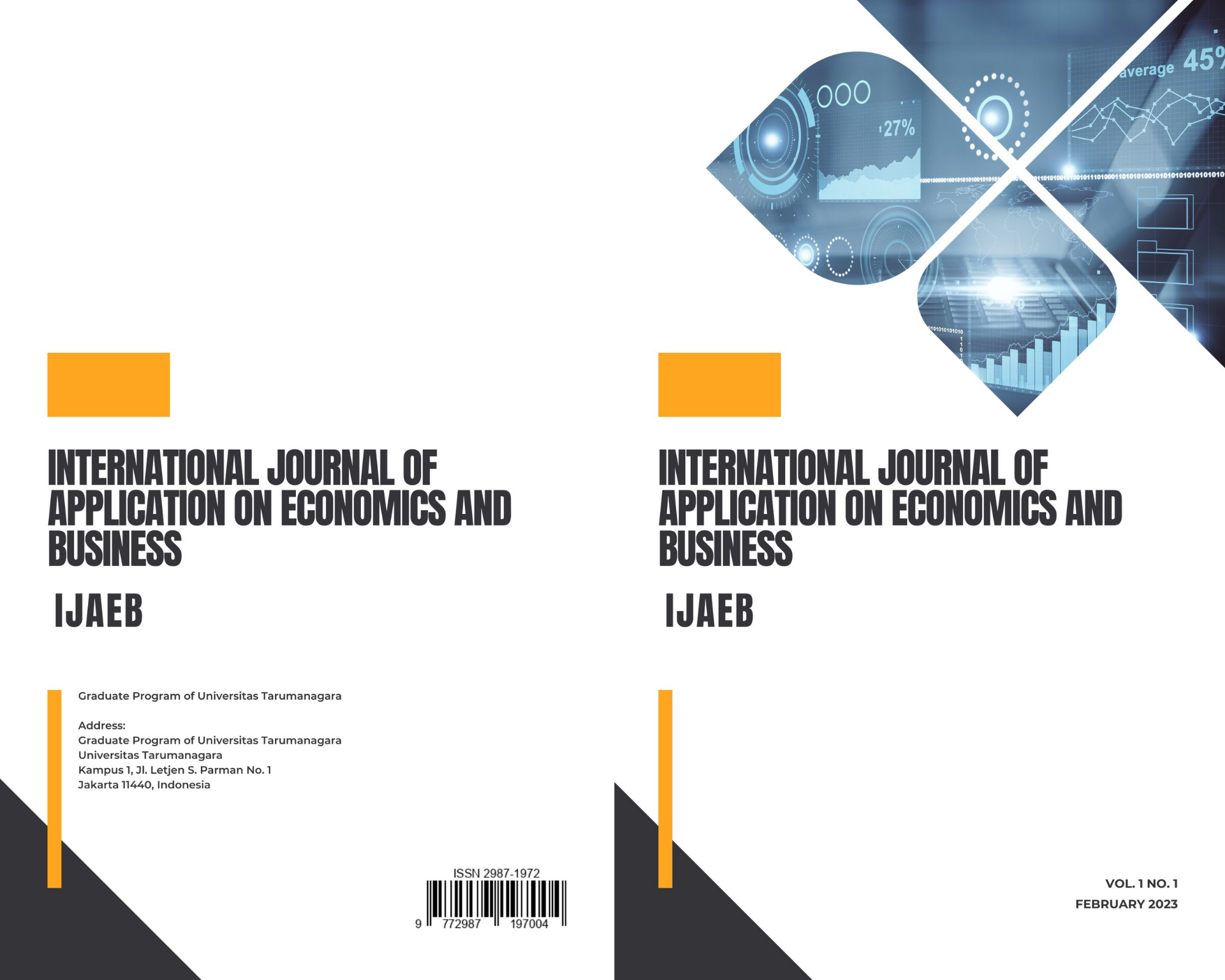The Role of Green Entrepreneurial Orientation and Self-Efficacy to Encourage Student Intention in Green Entrepreneurship
Main Article Content
Abstract
Aligning with achieving sustainable development goals (SDGs), the entrepreneurship sector has a responsibility to synergize between the economic goals and environmental goals through implementing the model of green entrepreneurship. This study develops a model involving green entrepreneurial orientation and self-efficacy to improve the student intention in green entrepreneurship. Totally 180 students from the Economics & Business Faculty of Universitas Tarumanagara Jakarta are taken as respondents. The regression approach is used to analyze the data with the result as follows: the green entrepreneurial orientation owns the higher impact on green entrepreneurship intention, while the impact of self-efficacy is lower than this entrepreneurial intention. Based on this result, supporting of university needs to realize students in developing their business ideas in line with the effort to preserve the environment in the future. It is relevant to achieving the target of SDGs in 2030. The double bottom line orientation is perceived strongly by respondents. Through entrepreneurial learning, educational institutions together with stakeholders could contribute to building mechanisms to improve the education programs in green entrepreneurship. The next study can involve the legal aspect for supporting the sustainability of the green business.
Article Details
Section

This work is licensed under a Creative Commons Attribution-NonCommercial-ShareAlike 4.0 International License.
This journal provides immediate open access to its content on the principle that making research freely available to the public supports a greater global exchange of knowledge.
IJAEB by Graduate Program of Universitas Tarumanagara is licensed under a Creative Commons Attribution-NonCommercial-ShareAlike 4.0 International License.. Permissions beyond the scope of this license may be available at https://journal.untar.ac.id/index.php/ijaeb
References
K. Nuringsih, “Role of Green Entrepreneurship in Raising the Effect of Green Value Toward Sustainable Development,” Int. J. Econ. Business, Entrep., vol. 3, no. 2, pp. 29–46, 2021, doi: 10.23960/ijebe.v3i2.69.
K. O’Neill and D. Gibbs, “Rethinking green entrepreneurship – Fluid narratives of the green economy,” Environ. Plan. A, vol. 48, no. 9, pp. 1727–1749, 2016, doi: 10.1177/ 0308518X16650453.
K. N. N. M. Iwan Prasodjo, Rita Amelinda, “Sustainable Entrepreneurial Intention: The Perceived of Triple Bottom Line among Female Students,” J. Manaj., vol. 23, no. 2, p. 168, 2019, doi: 10.24912/jm.v23i2.472.
B. Mayoshe and K. Nuringsih, “Understanding Entrepreneurial Passion Among New Entrepreneurs,” Proc. Int. Conf. Econ. Business, Soc. Humanit. (ICEBSH 2021), vol. 570, no. Icebsh, pp. 251–257, 2021, doi: 10.2991/assehr.k.210805.040.
V. Valenrie and K. Nuringsih, “Fostering Eco-Entrepreneurial Intention Among Students,” Proc. Int. Conf. Econ. Business, Soc. Humanit. (ICEBSH 2021), vol. 570, no. Icebsh, pp. 985–992, 2021, doi: 10.2991/assehr.k.210805.155.
Y. I. Masjud, “Ecopreneurship Approach As a Solution To Environmental Problem: Implication for University Entrepreneurship Education,” J. Environ. Sci. Sustain. Dev., vol. 3, no. 1, pp. 97–113, 2020, doi: 10.7454/jessd.v3i1.1041.
H. Firmana, G. G. Manik, and A. Surya Kusuma, “Entrepreneurial orientation and entrepreneurial intention: When more learning exposures are efficacious,” J. Ekon. dan Bisnis, vol. 24, no. 2, pp. 271–288, 2021.
T. Gevrenova, “Nature and characteristics of green entrepreneurship,” Trakia J. Sci., vol. 13, no. Suppl.2, pp. 321–323, 2015, doi: 10.15547/tjs.2015.s.02.068.
E. M. Hugo and K. Nuringsih, “Entrepreneurial Education, Green Orientation Entrepreneur, dan Green Value terhadap Ecology Entrepreneurial Intention,” J. Manajerial Dan Kewirausahaan, vol. 2, no. 4, pp. 914–924, 2020, [Online]. Available: https://journal.untar.ac.id/index.php/ JMDK/article/view/9871/6519.
Y. Guo, L. F. Wang, and Y. Chen, “Green Entrepreneurial Orientation and Green Innovation: The Mediating Effect of Supply Chain Learning,” SAGE Open, vol. 10, no. 1, 2020, doi: 10.1177/2158244019898798.
R. L. Bradley, B. L. Browne, and H. M. Kelley, “Examining the Influence of Self-Efficacy and Self-Regulation in Online Learning,” Coll. Stud. J., vol. 51, pp. 518–530, 2017.
I. D. A. N. Spiritual, Baku Umbi-Umbian Berbasis Produk Kue Kering Berbahan Baku Umbi-Umbian Berbasis Ipteks. .
T. H. Himel, S. L. Muniandy, and A. A. Rahman, “The relationship between self-efficacy, feasibility and awareness towards green entrepreneurial intention,” Sci.Int. (Lahore), vol. 28, no. 2, pp. 2095–2103, 2016.
P. Piperopoulos and D. Dimov, “Burst Bubbles or Build Steam? Entrepreneurship Education, Entrepreneurial Self-Efficacy, and Entrepreneurial Intentions,” J. Small Bus. Manag., vol. 53, no. 4, pp. 970–985, 2015, doi: 10.1111/jsbm.12116.
S. Ini, D. Sebagai, S. Satu, P. Untuk, and G. S. Pendidikan, “Pengaruh efikasi diri (,” 2013.
F. Hernández-Perlines and M. A. I. Cisneros, “The role of environment in sustainable entrepreneurial orientation. The case of family firms,” Sustain., vol. 10, no. 6, 2018, doi: 10.3390/su10062037.
W. Jiang, H. Chai, J. Shao, and T. Feng, “Green entrepreneurial orientation for enhancing firm performance: A dynamic capability perspective,” J. Clean. Prod., vol. 198, pp. 1311–1323, 2018, doi: 10.1016/j.jclepro.2018.07.104.
Y. Zhao, Y. Li, S. H. Lee, and L. Bo Chen, “Entrepreneurial Orientation, Organizational Learning, and Performance: Evidence from China,” Entrep. Theory Pract., vol. 35, no. 2, pp. 293–317, Mar. 2011, doi: 10.1111/j.1540-6520.2009.00359.x.
S. Kristiadi, “Pengaruh Sikap Berperilaku, Norma Subjektif Dan Efikasi Diri Terhadap Intensi Kewirausahaan Pada Siswi Melalui Motivasi Di Smk Negeri 1 Pati,” J. Econ. Educ., vol. 5, no. 1, pp. 11–21, 2016, [Online]. Available: http://journal.unnes.ac.id/sju/index.php/ jeec%0APENGARUH.
J. Amankwah and H. Sesen, “On the relation between green entrepreneurship intention and behavior,” Sustain., vol. 13, no. 13, 2021, doi: 10.3390/su13137474.
B. Bird, “Implementing Entrepreneurial Ideas: The Case for Intention,” Acad. Manag. Rev., vol. 13, no. 3, pp. 442–453, Jul. 1988, doi: 10.5465/amr.1988.4306970.
G. T. Lumpkin and G. G. Dess, “Clarifying the entrepreneurial orientation construct and linking it to performance,” Acad. Manag. Rev., vol. 21, no. 1, pp. 135–172, 1996, doi: 10.5465/ AMR.1996.9602161568.
D. Kainrath, “Ecopreneurship in Theory and Practice - A Proposed Emerging Framework for

